266: Tackling Perfectionism on Kilimanjaro with Kalli Wilkens
Entrepreneurship • Nov 15, 2023 10:20:10 AM • Written by: Erin Aquin & Steve Haase
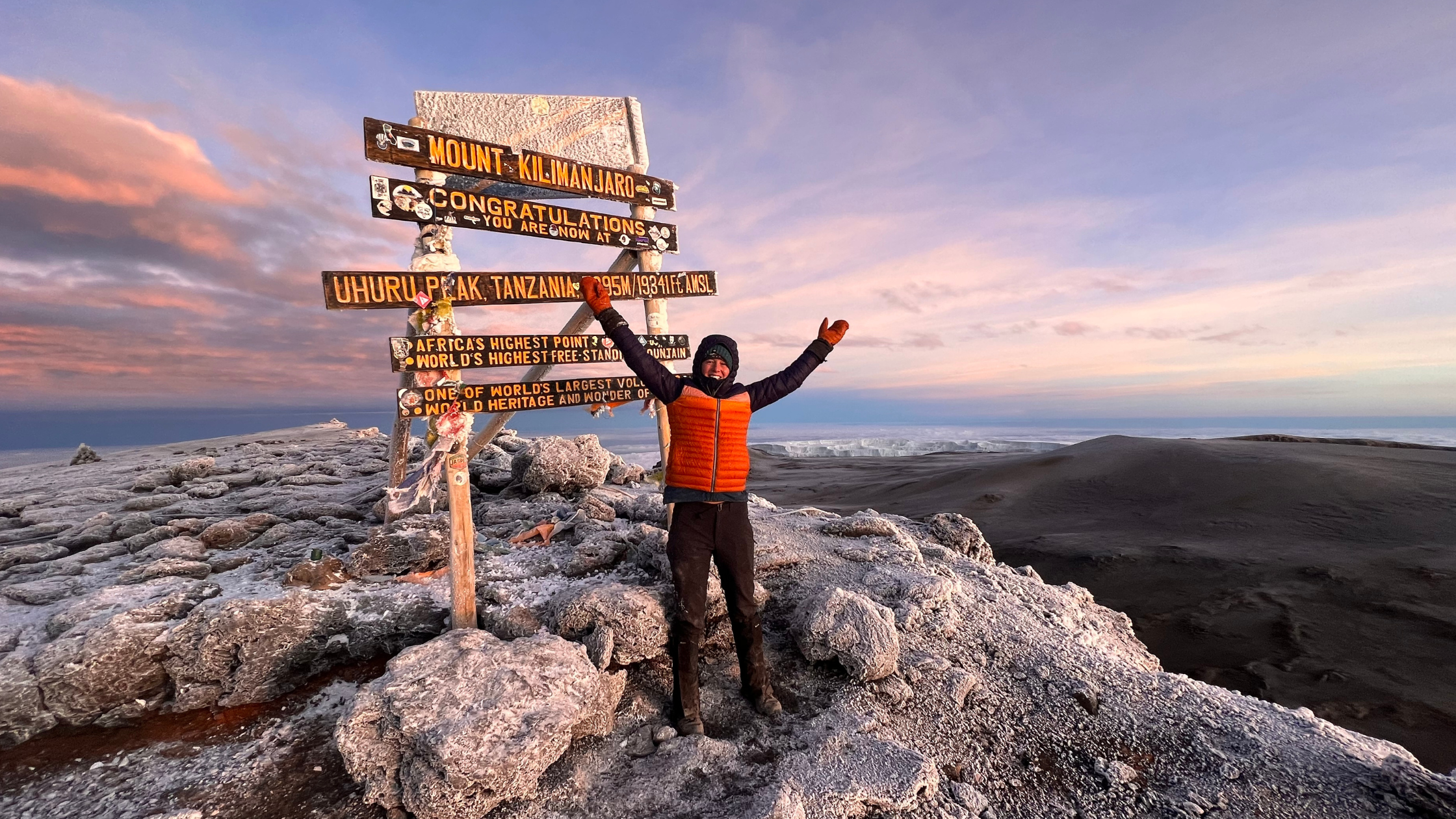
If you have big dreams but find yourself more often in a "planning loop" without getting to much of the doing, today's episode will help you make real progress on them.
Our special guest, Kalli Wilkens, is a physiotherapist and life coach who shares her own struggles with perfectionism. In today's episode, she relates how she used her dreams of an epic adventure in Africa to shift away from needing everything to be perfect before making progress.
You will discover:
- The causes of perfectionism and a powerful insight that can free you from it
- How to increase your own sense of significance in the world through a simple mindset shift
- How to use decisions to break through procrastination and fear
Visit Kalli's website here.
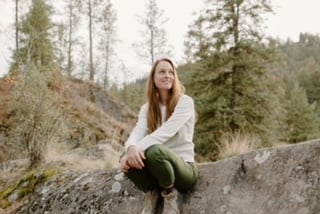
Enjoy some pictures from her climb:
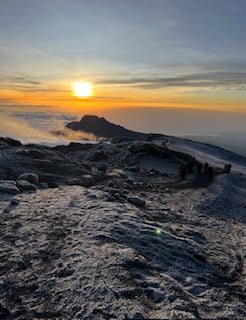
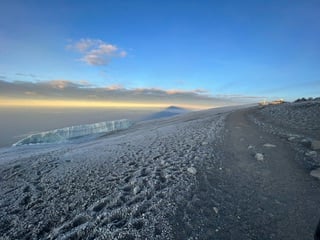
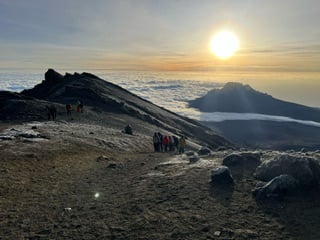
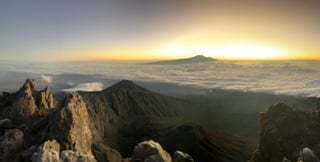
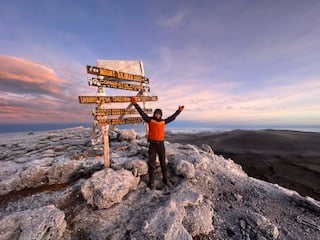
Episode Transcript
Steve Haase 0:01
Welcome to the Superabound podcast with master coaches Erin Aquin and Steve Haase. We're business owners like you learn tools that help you clarify vision, clear up static and overcome challenges. You are listening to Episode 266 tackling perfectionism on Kilimanjaro. I'm excited to share today's conversation between Kalli Wilkens and Erin Aquin with you today. Kalli is a very special person. She is a life coach, a physiotherapist and has been a client of Superabound for several years, working hard to overcome her own perfectionism so she can achieve big things in the world. And today, she's sharing a vulnerable conversation with you about how she did that through her hike up Mount Kilimanjaro. If you are a perfectionist, or high achiever and find yourself shying away from adventure, because you need it to be just so or have it all planned out. Today's episode will be a fun listen for you. You can learn more about Kalli and check out some of the pictures from her hike at besuperabound.com/podcast in today's show notes. Let's dive in.
Erin Aquin 1:08
Welcome. I really have wanted to have you on the podcast for a very long time. For anyone that doesn't already know Kalli, you just have to go like if as long as you're not driving while you're listening, you just have to go follow her on Instagram right now because she posts the most epic pictures from her hiking and from all of her adventures. And she just has the most thoughtful way of talking about some of the more I could call it like the more vulnerable side of mindset work. So very excited to have you here. Welcome. How are you doing today?
Kalli Wilkens 1:46
I'm good. I was not expecting that intro, which you probably get that every time. And it's definitely made me not want to take my trips and excursions for granted. Because sometimes I do. So I'm like I should look up my pictures because that sounds amazing.
Erin Aquin 2:01
They really are. And specifically today, I wanted to talk about sort of the journey between having an idea, a lantern you want to light and then actually making it happen. And I remember a few years ago, we were coaching together and you said to me, one of my milestone moments is going to be when I hike Kilimanjaro
Kalli Wilkens 2:24
when I first started with you years ago, you were just asking me about what I wanted from life, each aspect. And I just remember being Florida like I have no idea. But shortly after that I do remember getting more into the nature and hiking. And so yeah, it makes sense. But for sure it's come a long way since those conversations. You
Erin Aquin 2:46
are also just one of the most like impressive people I tried to think about what I was doing in my late 20s. And it definitely was not any of this work. You have some pretty big accomplishments already. You are of course a life coach, but you're also a doctor, a PT. Yeah. And you've traveled quite a bit. I'm always curious with someone who's such a high achiever. What is it like to kind of have have so many of these big milestones already, like done and dusted before age 30.
Kalli Wilkens 3:26
I wish I had the same outlook as maybe someone on the outside would because I like we just I just see my dress to kind of take them for granted. And I'm now what what's next? And downplaying is probably one of my strong suits. So it's just interesting because I'm like, I don't think I've accomplished I feel like I've just scratched the surface of like, oh, there's so much more to accomplish, but
Erin Aquin 3:50
I would like a true high achiever.
Kalli Wilkens 3:54
I'm like backflush I'm like I've never really thought about because I'm like, Well, I'm just living everyday life. And I don't feel like I've competition. A ton. I think there's a lot more to uncover. Now.
Erin Aquin 4:06
So as someone who you know, you've you've been a high achiever, I think you really understand high achievers, a type personalities. overachievers really well, from the outside. People always think, Oh, what an impressive person. I would love if you could maybe start by just shedding some some truth on what that experience is actually like, when you've been achieving amazing things, even from a very young age.
Kalli Wilkens 4:33
Yeah, I mean, first of all, no one feels put together. Not even the perfect people. I mean, I shouldn't say no one but I mean, I never did. I'm just gonna speak for myself. I never felt put together. I think that's kind of why I look so put together because I was always striving for the next thing and other accomplishments. Performance is a big deal. That's like, my language, performance and the grading metrics of me numbers of like, How can I see how I'm doing and measuring my success by the metrics and the performance. And I think that's why people tend to look so put together is just is like that motivator. And we discussed that a lot. I'm working with you as my coach of when fear of failure and not achieving the metrics in the performance isn't a driver, like what is. And that's been a different journey. But for perfectionism, it tends to be very, that's how you measure things is by the performances and achievements. Is your you're doing well in life if you're achieving? Yeah,
Erin Aquin 5:32
I mean, how does that feel from for some, from someone on the inside, I'm definitely not a perfectionist, I think I think I dropped those tendencies early on, because I was not going to be perfect. But as someone who may be that was how things were measured for you. And you know, I know that's the case for a lot of your clients. What is the internal experience when you start to shift into finding your worth from other sources and not just from achievement? Well, after
Kalli Wilkens 6:04
the deconstruction identity crisis, you actually just, it's really isn't identity. Our was a crisis, but it's a change, because it's like, you actually have to start tapping into who I'm gonna use myself who like I like, who is Cali? What is Cali? Like? What is Cali think, you know, again, for myself, instead of the external performative measures are getting, like I remember, even just a couple years ago, I was still wanting to get more letters behind my name, because then I thought I'd have more understanding, or then like life or be more successful. And so there was shame around not doing residencies and fellowships and continuing on. But I would say, when you get to let go and shed those layers, that's when you really get to kind of meet yourself. And then if you do accomplish things, say, and I'm not saying getting more letters behind your name is bad. Say that is your desire and stuff, it becomes more fun than, like, painful and like, Your worth is tied into it. So I'm not dogging people who like go into more education and stuff for whatever they pursue. Because if that's what you truly want, then you should go out at 100%. Yeah,
Erin Aquin 7:20
but it's it's mainly that comes back to the question of like, what is your individual desire, which I think that if I as an as most of us do, whether folks who are perfectionist and high achievers or not, I mean, from a really young age, it's so easy to measure your worth by your grades, by how how you can please the adults around you and the people, the people who have control over the direction of your life that is like a game, I think we all kind of learn how to play. Something you touched on that I'd love to maybe talk about a little bit, as you said, you started spending more time in nature as you deconstructed and maybe separated out your desires from the High Achiever expectations. What shift Did you notice when you started spending more time outside?
Kalli Wilkens 8:19
I actually just started to value life. In general. I know like shortly before he and I started working together, I was very depressed. And then shortly after you and I kind of got together, and during those times, sitting outside, like I just would even hyper focus. And this may not resonate with anybody or may really I feel like it's one or two roads. But I remember looking at like a blade of grass. And just being like, this is the only blade of grass like sure there's millions and billions. But this is this blade of grass and I are having an intersected moment in the universe. And it's one of a kind, it's only here for a fleeting moment. And just realizing like it doesn't stress, it doesn't care. It's not going to school or trying to figure out the meaning of life. Like it's just expressing itself. And I would just look at the different textures of bark or trees. And I just started I don't know, even with what I back then I was doing more trying to get in triathlons. And I'd even like pretend that they were encouraging me when I'm like trying to bike up a really steep hill. I'm like, they're they're rooting for me, like I don't know, I just started like making them come alive in a way. But I just started thinking about how this blade of grass has significance. And then it started making me realize that I have significance, you have significance. But sometimes you can't escape and get out in nature. So I say a blade of grass because I'd be in my neighborhood up on a hill somewhere. And I just wanted to spend more time there because I was confused about a lot of other things like we've talked about religion, which is a whole other topic for another day. But I could resonate with If the pieces of nature
Erin Aquin 10:03
Yeah. And I love that, because I think I think something that's really interesting, like in the mindset world is people think it's like this very serious pursuit. You know, when your mindset you're like going over your your thoughts with like some fine tooth comb when you're, you're trying to like, block out the quote unquote bad ones and throw sunlight onto the quote unquote good ones. But I think that people don't realize that a lot of times the stories and the narratives that keep us stuck are things that we, we don't ever question. And someone might hear this playful idea of like, what if I just decided to believe or play with, you know, this hill wants me to run up it right now this, this mountain would like me to climb it and just experience it. And it's thrilled that I'm here. And we just kind of give the give sort of a personality to nature as a conscious, maybe playful, maybe real thought experiment. I know so many people who would who maybe would write that off. But I think it's actually one of the most powerful points of thought work, because you can just see it, I really believe that we'll get at this mountain. Yeah, I'll you know, I will make time to go outside. If I feel like, the grass wants me to sit on it. Yeah, there's something just like soothing and comforting. And it brings some kind of wander into a world where I think we view the world around us a lot of times, it's just like, just inanimate, unconscious. But I think it's more fun to, to see it as alive and be in relationship to it. So I love that that's a practice that you have.
Kalli Wilkens 11:46
Yeah, it makes it more symbiotic. So like, if I believe it's out there for my own good, then I'm going to take care of its own good, you know, and then the planets a better place because of it. Yeah.
Erin Aquin 11:58
And if your lanterns that we talked about a few years ago, was hiking a really big mountain. Mm hmm. Well, can you tell us about how that whole journey came together and what it was like,
Kalli Wilkens 12:10
I don't even really think I understood what Kilimanjaro was, like, I know it's in like a toto song. And, like, it's cool. It's a mountain. But I had no idea anything about it. So when I first was talking I was introduced to me was when I was talking to my boyfriend, and we were just getting to know each other. And he was like, Oh, my friends, I want to climb Kilimanjaro. And he described this itinerary of climbing a mountain going on safari, and then flying to Zanzibar, which is an island off of Tanzania. You know, you start to do research, like, well, what is this Kilimanjaro and it's the tallest mountain in Africa. And it is I don't know, my meters very well. So I'm just gonna say stay in feet, but 19,341 feet in elevation. And when I say regular hike, so you don't need any ropes or gear. So it seems like a good introductory, but insanely tough goal. And so it was just like, well, that would be cool. If someone plans it like this guy, if his friends go out and do it, I just told him, I was like, Oh, if your friends go and do this, let me know. Because I'll try to come like it was more of like, I could tag along if someone else planned it, or had these trips, like, I just need to know the right people. And then I can ride along and that song escaped by life is going on other people's trips. But I think about a year ago, I have this philosophy. And I remember telling my boyfriend of like, if we just start telling people and like, we have to decide, this is going to happen. And so I'm like, we're gonna do it. 2023 We're climbing Kilimanjaro. Because when you tell people and you know, it's a 100% decision, but all you have to do is figure it out, you know, and I say that facetiously, because that's like the hardest part. But almost just coming to that decision, as it's as good as done was a really, really big step in like, let's figure it out. Kind of thing. Yeah,
Erin Aquin 14:02
that is a mindset superpower. That's how we started traveling to Hawaii almost every year for a month. I was very, I was very pregnant and very fed up with the Boston winter. And I just kept telling Steve, next year, we're spending a month in Hawaii. And I just kept saying it over and over again. Until we had to start booking flights and making plans. I'm like it is happening. We're taking on this baby is going to be in Hawaii next year.
Kalli Wilkens 14:30
Yeah, like it's not going to be inside my belly. It's just gonna be me on the beat. Not gonna
Erin Aquin 14:34
be sad. There's not going to be snow. And I mean, that's that's the thing. I think a lot of people are scared to declare it especially to other people for exactly the reason you said for fear of failure, but it is such it's like the Express Pass to making something happen. Because then suddenly you start talking about something and people are like, Oh, my friend Why out there, here's something you should
Unknown Speaker 15:01
do. Because that totally is what happens
Erin Aquin 15:04
on the mountain. You know, you shared with me that it was there was like, kind of some spiritual and deep moments for you.
Kalli Wilkens 15:13
Yeah, it's so interesting, cuz when we talked about doing this podcast, I was like perfectionism, I want to look like really good and empowered and like, nothing's holding me back. But there were the night before Summit. So the way Kilimanjaro works, and we actually did a mountain before to do a warm up, it was a four day hike, which to me is funny, as a warm up as a warm up. But it really, it helps because it helps get us up high, we acclimated well, so Kilimanjaro was less painful. And on that first mountain, all of my insecurities came up all of those inner voices of me not being good enough body image issues, insecurities about my career, with physical therapy, coaching, like, basically, all my worst fears, was just very present in my mind. And I was like, This is not how it's supposed to be, I'm doing my goals. And then, like, a few days later, when I'm about to summit Kilimanjaro, so you go to bed for a couple hours. And then you wake up at 11pm. And then you start hiking at midnight to get to the summit by sunrise. And it's really steep, and you're already high, your a lot of people get altitude sicknesses and get like there was helicopters taking people off the mountain that day that we were so many, so it's a big deal. So that night ish, I say night, because it's like a map, you have to wake up at 11. I just started crying. I just felt all my fears again. And I was like, I'm supposed to use this to encourage others and to live my life's purpose, everything. And I just remember asking myself, like, why are you here? Like, why are you doing this, because I knew I was gonna finish it. Unless something really bad happened to medically and my motto is dying isn't fun. So if, if it did come to anything death, like I would turn around, and so I knew I was like, gonna turn around. So I'm sitting there, I'm just crying myself to sleep. And I couldn't come up with any reason as to why I was there. I'm like, It's not to impress my family, because they haven't studied and they don't know how big of a deal this is. It's not to impress people, because there's a lot easier, cheaper ways to impress people than to spend a month and we're camping. You don't have good toilets, you're not showering. So like, it was a lot of icky suffering throughout it. And it really wasn't bad. Like the outdoors was great. But I'm saying like the living wasn't luxurious. And so I'm sitting there just crying, like, and I couldn't figure out like, why am I here and so dead set on doing this. And I just remember the moment of like, it really just came down to just cuz I can and it doesn't have anything to do with anybody else. And I was like, okay, you know, cry it out, reset my nervous system, I felt more relaxed and calm slept for three hours. And the hike was really hard that night. But it was okay, because it was expected. But yeah, it was just like those moments of rawness and like why are my worst fears coming up, and not having an eloquent reason for why I was doing what I was doing and why I had planned for years. Like it just didn't make sense. Other than I could and I just had to let that be enough. I
Erin Aquin 18:24
think that that is one of the most powerful things that so many people they kind of don't go after their dreams because they think it has to be for some big grand purpose not just because they can house because I want to doesn't even start even glamorous, like you can get some nice pictures and someone else took you wanted some nice picture. This is the case for so many people like whether their dream is to have a business whether their dream is to go mountain just because you can can be reason enough and it's a way of like, you have to take it back to what you said about the blade of grass just expressing itself then need a different reason to exist. Just because you can isn't reason enough as anything shifted for you in your relationship with yourself.
Kalli Wilkens 19:20
I definitely had some lessons from the mountain I think I'm still mulling it over I came home a week ago and instantly was felt overwhelmed with other work and stuff. So I haven't had like a lot of time to just sit with the completion of it because I've just been Go, go go. But I feel like and maybe this is direct or indirect but for some reason and the reflections of my past two weeks this phrase that keeps going through my head is connection not correction. Like the mountains are imperfect. I know I love it. I think it's amazing. And I'm like that's just like I'm like that's my way of life of it's not Like being on the mountain was imperfect. I cried. I acted out at times. But I also laughed, had happy tears. Like, I remember touching the sign at the summit. And I'm just like, tearing up, like, Oh, my goodness, I'm here. And it was like super emotional just to be up there. And it was imperfect, but also seen the other people. And I know, we talked about comparison, as don't compare, you know, but being with so many different people, because I think about 400 people attempt to submit it a day. So you kind of see different people from different countries, different ages, and everybody's doing it for different reasons. And you just realize, like, it's just this, everybody's imperfect, everyone's doing their thing. And so that was really important for me to was like, well, people are just doing their own thing. But we're all together separately. And so I guess for me, most of the lessons I took away from it was my approach to this business of coaching world and not going as planned and not having the, you know, the metrics success that I talked about was so meaningful to me was that you can go slow, because first of all, they make you go so slow. And then it doesn't feel as hard. I mean, summit day is hard, even if you go slow, and, and taking breaks, like you feel miserable everywhere. And that standard. So it's not like you're doing anything wrong if you struggle on a mountain. But just to like, hey, it's part of the journey. And if I'm rushed and burnt out, I'm not going to show up the next day for my business. Yes. But if I'm just slow pacing myself, Yes, take time, take pictures of flowers enjoy each day, even though I didn't summit every day, I had to see different terrain and not compare yourself because you pass different groups. And then when you're taking a break, groups pass you but you have no idea what time they started in, there was just kind of interesting that it definitely shifted to where I want to think about my, my coaching business as an expression of just me and my journey just because I can and because I want to not a race or anything, but the slower I can take things and pace myself, I'll probably see more enjoyable things along the way. So that was my bigger takeaways was how I wanted just to approach my other goals, such as being an entrepreneur. Right now,
Erin Aquin 22:28
I think you also said something that's really important that I just want to echo for everyone out there that is an entrepreneur who may be, you know, at a tough point right now. When you just expect that it's gonna be hard. And you don't make it mean something because you're moving slower, more, maybe more slowly than you could or then you think you should, as you said, you don't know when the other groups who are passing you started, you don't know what their capacity is. So it's really easy to compare yourself to people who are around the same point as you, the muscles built from the training are going to kick in the expectation that this could be the hardest part of the journey. It's a good thing to kind of keep in your cap as a as a business owner as well. Yeah,
Kalli Wilkens 23:20
it definitely gives permission to lean into it. I don't think it should be forever. Like, I don't think people should be miserable and suffering the whole time. But there is some time for that. I mean, you're, for instance, on the mountain summit, you're hiking in the dark, you have headlamps there's when you can't even see the top, you just gotta trust, it's there. And each step has so much merit and just like being fine with it. So that's actually one thing I did to while hiking. I don't know if other people do this with exercise, but I'm a counter, meaning I just count each step up until 100. Then I start over. So when I'm really really, really feeling terrible, I just count. And then I don't worry about the speed. But yeah, I like the idea of just allowing for things to suck. And I know the reason I'm glad you highlighted that because I feel like we're very misery aversive, like, something's gone wrong. Or we're martyrs. And then I think we inflict too much on purpose. And we'll make it too hard. So I liked that. This was like just enough this mountain, you had to pace yourself because you shouldn't be miserable all the time. But if you're cold and miserable in the middle of the night, when you can't see the top and just focus on each step. And yeah, and one of the thing about that is, I had to learn how to enjoy it, not just the sucky moments, but not being so competitive or worried about other people or like my goal is just to get to the top of Kilimanjaro and talk about it, but like pausing and reminding myself to look at the grass to look at the rock to look because there's stuff on the way because I eyes tend to put myself in a misery restate with business during school of like, well, I just have to be miserable till the top or till I'm finished. So I just want to throw that in of like, yes, it's okay to be miserable doesn't mean you're a failure. But it's also okay to like where you're at.
Erin Aquin 25:14
So good. I think that's a good, it's a great thing for people to hold. So it's really funny, you're talking about the night hike, because in our book that's coming out in summer, the whole story is hiking up a mountain at night. And when I had the idea, I didn't know you were doing this. It's a good metaphor for entrepreneurs.
Kalli Wilkens 25:33
Yeah, that's actually really cool. Because I love the idea of that, because it really just captured a sunrise we, it doesn't have to be coaching or anything, but you just feel like you're in the dark night. And you can only see what the lamp is showing right in front of you or the lantern. Yeah, it's very real, especially like when you don't know how far the top is, you just know, like, it will say I don't have a compass, but you just set the compass, or you just look up and you're like, the top is that direction, and you just trust the steps.
Erin Aquin 26:03
I think that's good for all things. You have to trust that you're walking in the right direction, you will get where you want to be. And I just want to say thank you for coming on and sharing your vulnerable story. I think one of the qualities that makes you such an amazing coach is the fact that you are also real and the wisdom that you have is your own lived experience, not just things that you read in a book, it's actually comes through your own grappling with what is it like to be a high achiever who is very smart in the world? Like what is it like to have adventures and do things just because I can not because I'm gonna get top marks. So I just want to appreciate that. Thank you so much for being here today.
Kalli Wilkens 26:48
Yeah, thank you for having me. I'm gonna go pick some pictures out now and send them to you.
Erin Aquin 26:53
Amazing. Thanks.
